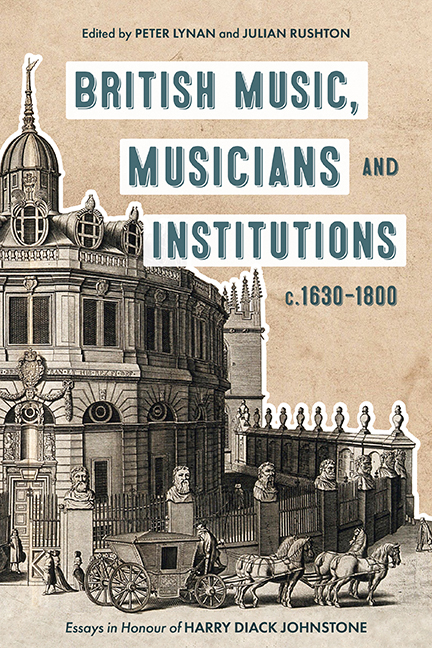Book contents
- Frontmatter
- Contents
- List of Illustrations
- List of Music Examples
- List of Contributors
- Acknowledgements
- List of Abbreviations
- Note to the Reader
- Introduction
- Part I Performers and Performance Style
- Part II Composers and Secular Institutions
- Part III Sacred Music and Institutions
- Part IV Dissemination: Copying, Printing, and Publishing
- Epilogue: Musica Britannica and the Eighteenth Century
- Harry Diack Johnstone: A Tribute
- Bibliography of the Publications of Harry Diack Johnstone
- Index
- Tabula Gratulatoria
3 - Thomas Vincent (1723–1798): Oboist, Composer, and Entrepreneur
Published online by Cambridge University Press: 06 October 2022
- Frontmatter
- Contents
- List of Illustrations
- List of Music Examples
- List of Contributors
- Acknowledgements
- List of Abbreviations
- Note to the Reader
- Introduction
- Part I Performers and Performance Style
- Part II Composers and Secular Institutions
- Part III Sacred Music and Institutions
- Part IV Dissemination: Copying, Printing, and Publishing
- Epilogue: Musica Britannica and the Eighteenth Century
- Harry Diack Johnstone: A Tribute
- Bibliography of the Publications of Harry Diack Johnstone
- Index
- Tabula Gratulatoria
Summary
❧ A Confusion of Vincents
Anyone who has worked on the numerous dynasties of minor musicians active in Britain during past centuries will be familiar with the difficulty of disentangling their several members. To the possible ‘horizontal’ confusion of individuals, encouraged by the common practice of using only surnames with or without a ‘Mr’, must be added the ‘vertical’ confusion brought on by the passage of the same forename, like an heirloom, from father to son. The case of the Vincent family exemplifies the problem in acute form, since major modern reference works repeatedly stumble into error or betray excessive caution on this account. The present chapter, which focuses on the life and music of just one member of the musical Vincents – identified here as ‘Thomas (II) Vincent’ – will refrain from easy point-scoring, wherever possible using primary sources to advance the argument. The result is a fascinating story.
❧ The Vincent Family
We may conveniently start with a pared-down family tree showing the six Vincents known to have been professional musicians, and their principal instrument(s) (Fig. 3.1). Probably most of them mastered several instruments. Rather unusually for an oboist of his period, Thomas (II) is not recorded as a player of other treble woodwind instruments, but he was at least a competent harpsichordist.
The first of the Vincents active as musicians in London was Richard (I), baptized in the Leicestershire village of Sheepy Magna on 20 September 1667 and buried in his parish church of St Martin-in-the-Fields, Westminster, on 9 October 1731. As can be established from details concerning bequests in Richard's will, proved on 8 October 1731, he belonged to a prominent and long-established landowning family resident in Sheepy Magna and the surrounding countryside. His father was George Vincent (c.1625–1707), who had in 1691 married Elizabeth Tovey, daughter of the rector of Aylestone and Lutterworth in the same county, and his grandfather was a Cambridge graduate, William Vincent (1598–1680).
Both George and William styled themselves, appropriately for their status and landed wealth, ‘Gentleman’. Richard (I), however, describes himself in his will merely as a ‘musician’. This acknowledgement of downward mobility reflected a sad reality.
- Type
- Chapter
- Information
- British Music, Musicians and Institutions, c. 1630-1800Essays in Honour of Harry Diack Johnstone, pp. 54 - 71Publisher: Boydell & BrewerPrint publication year: 2022



